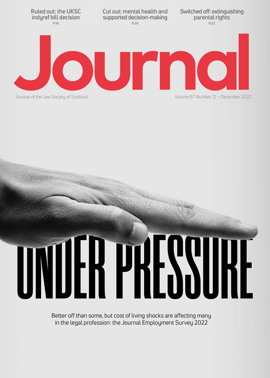AML: privilege for the law?

“From setting up complex company structures for clients to helping purchase luxury real estate and negotiate mortgages, lawyers play a critical role in facilitating and legitimising money flows.” Thus begins Spotlight on Corruption’s recent article on lawyers and AML (spotlightcorruption.org), immediately setting out both the tone and agenda for the piece.
Notable by its absence is the lack of any quantitative data suggesting that the work detailed in that opening gambit makes up much of the work of UK solicitors. On complex entity structuring, for example, recent Law Society of Scotland analysis of AML certificates noted that there were only 19 practices who reported having conducted any trust or company service provision with privacy jurisdictions; that is 19 out of more than 700 supervised firms. I know that’s not the be-all-and-end-all of apples with apples comparisons, but it’s interesting to see what starts to happen when you bother trying to involve two fruits at all.
The 88-page article is actually centred on the success or otherwise of the AML supervisory regimes implemented by the SRA, Law Society of Scotland et al, but I only get 800 words for this article, so I will stick to their eyecatching introductory sections on so-called “unique protections” afforded to lawyers.
Tropes about scope
The first such “unique protection” is that not all legal work is within scope of the AML Regulations. The article rightly notes that: “The dividing line between legal services that fall within the scope of the MLRs and those that fall outside their scope is not clear-cut”, and highlights that solicitors are left to decide for themselves on a case-by-case basis whether the due diligence requirements in the regulations are to apply. As noted in the article, the point of this is that certain services are at material risk of purposeful attempts to abuse them in the course of financial crime, and others are not.
This is the entire spirit of the oft-mentioned risk-based approach. To label this as a unique protection mischaracterises the situation, and solicitors who are left scratching their heads as they try to do the right thing by implementing an approach in line with the above will attest to the fact that it is not a protection: you may be pinning your hopes on the fact that your supervisor will one day inspect you and agree with the decisions you made, and the risk of being wrong may be large, however unfair that is. For those asking why we don’t just treat everything as “in scope”, the fact is that this would represent a step backwards and a blow to the pragmatism envisioned in a truly risk-based approach.
Defence open to all
The article also draws attention to “adequate consideration”, as provided in s 329(2)(c) of the Proceeds of Crime Act. The essence of the law here is that where any person acquires criminal property for adequate consideration, they do not commit an offence. There are nuances and technicalities here, but for the purposes of legal services it is classically read as “where you deliver a service and charge the commensurate fee, the money you charge is not criminal property”.
What should be noted here, though, is that this so-called “unique protection” is no such thing. It applies to all persons, from solicitors charging fees to Joe Bloggs buying a secondhand car. I was actually in a clothing shop the other day when the cashier (unaware of my profession) said they sometimes have people paying hundreds and hundreds of pounds in cash while texting on an old Nokia 3210 phone. I look forward to Spotlight on Corruption’s character assassination of the clothing retail industry.
Privilege: a headache
Last in line for demonstrating the wonderfully privileged position solicitors are in is the existence of privilege itself. I have more sympathy with the view that legal privilege is open for abuse. However, from my own experience and from speaking to colleagues in similar roles at legal firms, the reality is that assessments of privilege are almost invariably another serious headache to go through while considering the drafting of suspicious activity reports. Lawyers, understandably, do not take the breaching of fundamental rights to privilege lightly, quite aside from any civil liability risks which are envisioned (even if wrongly perceived). The label of “unique protection”, if technically correct, does not tell the full story.
The crux of the Spotlight on Corruption article is ostensibly not solicitors but their regulators, and in fact there are some great talking points throughout and I recommend giving it a read. It is a shame, then, that these sections referenced above perpetuate a nefarious, pinstripe mafia myth which seems at odds with the reality of the Scottish legal sector.
Perspectives
Features
Briefings
- Criminal court: Farewell retrospective
- Agriculture: A future support framework
- Corporate: Is there a creditor duty?
- Intellectual property: "Reclaiming the UK statute book"
- Sport: Flouting their own rules?
- Succession: Crofting tenancy transfers in intestacy
- Scottish Solicitors' Discipline Tribunal: December 2022
- Property: Conveyancing – the future is in our hands
- In-house: With a fair wind







